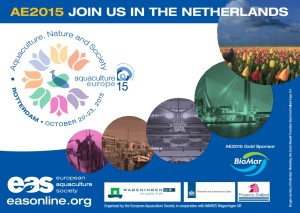WG1 CephsInAction meets AE2015
WG1 CephsInAction meets AE2015

October 23 – October 24, 2015
FA1301 COST Action Working Group 1 (Research Needs in Cephalopod Welfare) will join Aquaculture Europe 2015. AE2015 will take place at the De Doelen Congress Centre in Rotterdam (Netherlands), from 20 to 23 October 2015.
The AE2015 is organized by the European Aquaculture Society in cooperation with IMARES (Institute for Marine Resources & Ecosystem Studies) and AFI Wageningen UR (a collaboration between Wageningen University & Research centre and DLO foundation).
The participation of members of FA1301 COST Action to AE2015 is aimed to:
facilitate networking with specialists and SME working on topics of relevance to rearing and aquaculture of cephalopods, discuss approaches, strategies and possible collaborations for the achievement of important deliverables and results
allow beneficial interaction with other aspects of compatible disciplines and research done in other taxa
extend the potential of research efforts on biology and welfare of cephalopods
FA1301 WG1 members and representatives of FA1301 WG2, WG4 and WG5 will convene and contribute to AE2015 main program with a dedicated symposium (October 23). A series of other contributions (posters and free oral presentations) will also be delivered during the main program.
FA1301 WG1 meeting will occur as Satellite event of AE2015 on Saturday 24 October, 2015
During the meeting we will discuss approaches, strategies and possible collaborations for the achievement of important deliverables, and results of WG1, also in relation with other FA1301-WGs.
Aims
Synthesize and analyze the available knowledge on cephalopod biology, physiology and welfare. Evaluate the environmental, biological and behavioral needs of different cephalopod species to increase success of caring, maintenance, growth and rearing aimed to reduce stress and increase welfare in research and aquaculture establishments. Increase knowledge on nutritional requirements of different cephalopods species at various developmental stages including those required to improve health and welfare in aquaculture. Increase the knowledge of biological and physiological indicators (e.g. biomarkers) of welfare for cephalopods, also by increasing the use of alternatives to live animals in research, and the use of non-invasive approaches. Analysis of biological and physiological findings relevant to stress, nociception, pain assessment and management relevant to cephalopods. Evaluation of alternative methods to be utilized in experimental procedures. Evaluation of physiological and stress response during anesthesia. Development of humane endpoint. Development of online databases as guidance and inventory of alternatives. Further development of the CephsInAction CWI (Cephalopod Welfare Index) database-project by collection of statements (from scientific literature and best-practice), identification of animals’ needs, thus facilitate the linking of ‘statements’ to biological ‘needs’ in order to determine indicators of cephalopods welfare. Dissemination and Educational activities. Development of an EU accredited Training School Programme for Cephalopod Biology and Care in compliance with Directive 2010/63/EU.
Program
| Friday, 23 October 2015 |
CephsInAction WG1 meets AE2015
De Doelen Congress Centre “Plate Room”
G. Ponte, chairs
10:50 – 11:10 CephsInAction: A Network for Improvement of Cephalopod Welfare and Husbandry in Research, Aquaculture and Fisheries – COST Action FA1301 – G. Ponte – Italy
11:10 – 11:30 How to Get the Most out of your Cephalopod Experiment – Refining Methodologies to Assess a Given Diet or Reproduction Performance in Captivity – A.V. Sykes – Portugal
11.30 – 11:50 Cuttlefish in Captivity: an Investigation into Housing and Husbandry for Improving Welfare – G. Cooke – UK
11.50 – 12:10 Space as Requirement for Welfare: Effect of Confinement on Stress and Immune Response in the Cephalopod Octopus vulgaris – J. Estefanell – Spain
12.10 – 12:30 Potential Limiting Factors to the Growth of Octopus vulgaris – G. Fiorito – Italy
12.30 – 12:50 Digestive Enzymes Profile in Octopus vulgaris Paralarvae Fed with Artemia Enriched with Marine Phospholipids – V. Martin – Spain
12.50 – 13:10 Scientific Research on Paralarvae: Challenges and Opportunities Presented by Directive 2010/63/EU – P. Andrews – UK
| Saturday, 24 October 2015 |
CephsInAction WG1 meets AE2015
Hilton Hotel “Maaskant Room”
A. Sykes, chairs
9:30 – 11:00
Guidelines for Care and Welfare of Cephalopods under Directive 2010/63/EU Guidelines presentation – G. Fiorito
Comparison between recommendation provided by Guidelines and Cephalopod Culture book – G. Fiorito
Impact of Guidelines on cephalopod research – P. Andrews
Group discussion
WG1Questionnaire
results from the community – A. Sykes
results from SeaLife questionnaire – K. Perkins
discussion and how to proceed (group discussion)
11:30 – 13:00
Scientific Presentations
Early stages/pre-hatching experiences and effect on ceph behavior – a review from the literature – G. Fiorito
How space and context affect growth – the case of the octopus – J. Estefanell
Anesthesia and cephalopods: cardiovascular responses, requirements, use – C. Pugliese
a short report from people attending of the most important, interesting literature appeared over the last 12 months and pertaining WG1 activities – A. Sykes
14:30 – 17:00
New technologies and experimental approaches to promote the 3Rs’ principle
possible list of additional companies to be included
the current support from companies
Active projects and PhD thesis that may contribute to WG1
listing and identification of possible research for STSM grants in 2016
Grant possibilities
Requirements from the group and commitment – G. Ponte
What next
Planning ahead for the 2016 and call for the proposals to be discussed at Lisbon meeting
Other matters
| M | T | W | T | F | S | S |
|---|---|---|---|---|---|---|
| 1 | 2 | 3 | 4 | 5 | 6 | |
| 7 | 8 | 9 | 10 | 11 | 12 | 13 |
| 14 | 15 | 16 | 17 | 18 | 19 | 20 |
| 21 | 22 | 23 | 24 | 25 | 26 | 27 |
| 28 | 29 | 30 | ||||
This website is supported by COST, European COoperation in Science and Technology


